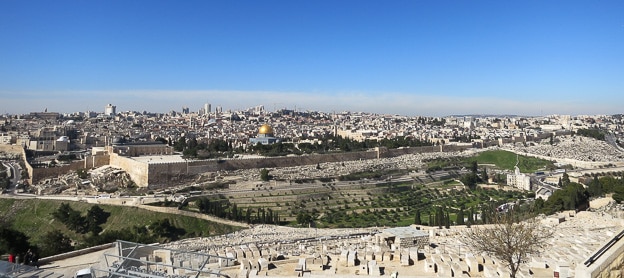
Sometimes it takes a while to get to know a new city. Such was the case with Jerusalem, but not for the reasons you might think. (No need to cry, ‘Whoa, it’s Israel! Panic, it’s the Middle East!’) Our reasons were a) I was recovering from pneumonia and “chose” to spend the first several days in bed; b) Jerusalem came to a halt over some predicted snow; and c) Jerusalem comes to a halt once a week anyway, for Shabbat, snow or no snow.
Once we got out of jail,* we collected helpful hints from people in the know, and restarted our visit. This post provides a look at the city as we found it. Another upcoming post surveys the two places everyone will insist you visit, and with good reason: The Israel Museum and the Tower of David Museum of the History of Jerusalem. We recommend you bookmark these for your visit to Israel. And our interview with Mordecai Holtz, marketing consultant to Jerusalem's tourism department, can be heard here.
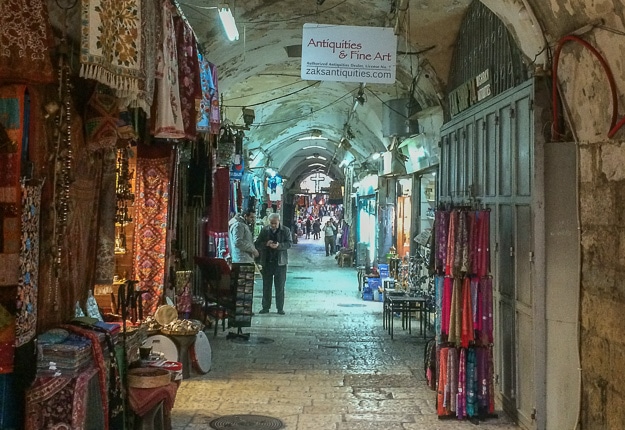
Setting the Scene
A reminder before you go: The heart of Jerusalem is the Old City, a.k.a. The Holy City. It represents thousands of years and millions of people. It’s a holy and historic site for Muslims, Jews, and Christians. And it is divided into four quarters: Armenian, Christian, Jewish, and Muslim. Of course, visitors represent many other lands and beliefs. Around town, it’s likely you’ll run into the YMCA, a Mormon outpost, a Fundamentalist center, an Ethiopian Church, and Russian and Greek Orthodox places of worship. That’s not counting the more homegrown mosques and synagogues.
What strikes the visitor, though, is not the division of sections in the city, but the fact that throughout its history and today, the diverse people work side by side and the neighborhoods mostly blend one into the other. Children chase each other through narrow alleys, vendors stand outside their shops and beckon guests, and everyone needs to eat. It doesn’t much matter where you walk.
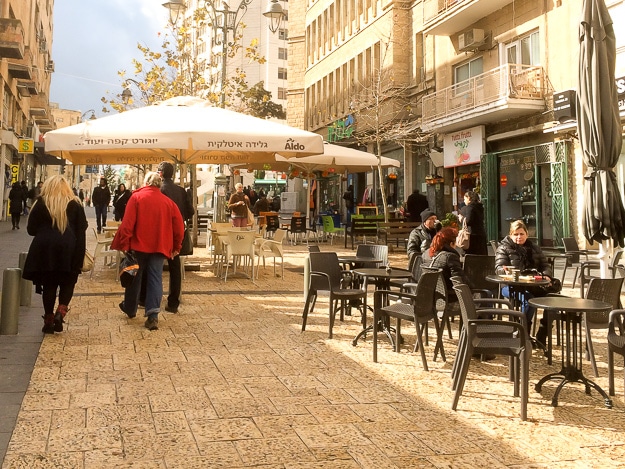
As Jerusalem spreads out from the Old City, it appears almost homogeneous. Buildings are uniformly shaped by the same blonde stone. New stone construction blends with the old. It’s all on the same bedrock, and the buildings rise from the ground using the same colors they are built on. Streets and sidewalks match, and are clean.
But at the same time, it’s hard to avoid picking out people’s differences, because so many wear their tribal or religious affiliations on their sleeve. Young and old display the signs: caps, curls, strings, hats; orthodox, observant, Hasidic, ultra this and passive that, a tribal name. There are U.S. students wearing their “Birthright” sweatshirts, and respectful missionaries wearing long skirts and clumsy shoes.
Getting Around
Jerusalem is a walkable city. From the downtown triangle and Ben Yehuda shopping area where we stayed, to the YMCA area and hotel district, to the Old City–all is within about 20 minutes' walk. So walk and walk and look and look.
Taxis are plentiful. You may want to catch a cab to Mount of Olives, and certainly to the Israel Museum. For access to the Central Bus Station, a nifty tram runs up the central corridor of Yafo Street and past the Mahane Yahuda Market.
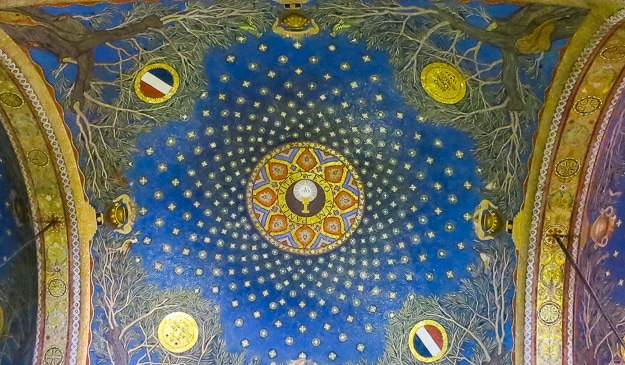
In the Old City
For orientation, check out ITravelJerusalem and their Old City app.
You cannot start with the Old City's landmark, the big gold dome. Dome of the Rock and Al-Aqsa Mosques, both on Temple Mount, are closed to non-Muslim tourists. But you can walk around and get the vibe, once you've passed through security. You can visit the Western Wall, however. It's the bustling west boundary of Temple Mount. Men and women approach separately. Plenty of people are willing to talk about their faith, or at least their hope for peace and understanding. Or ask for donations. On Friday evenings, after services, dancing and singing are likely to break out. Beware of having fun.
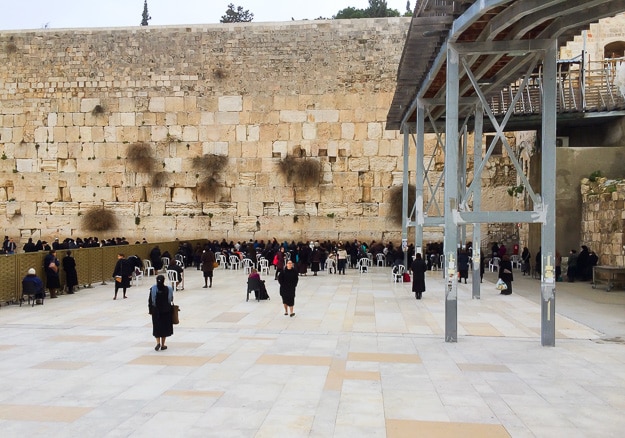
The Church of the Holy Sepulchre is interesting, if for no other reason than it's spooky, cavernous, disjointed, and the place where, as the story goes, Jesus was buried and rose from the dead. It’s really three or four churches in one, overlapping, ill lit and in need of repair.
The Via Dolorosa is a walk through the old city following the path of Jesus to his crucifixion. This route has been altered over time, as research and convenience dictate. Recent discoveries put the course in question again, as reported recently in The Washington Post. It’s sort of like a scavenger hunt through the Old City.
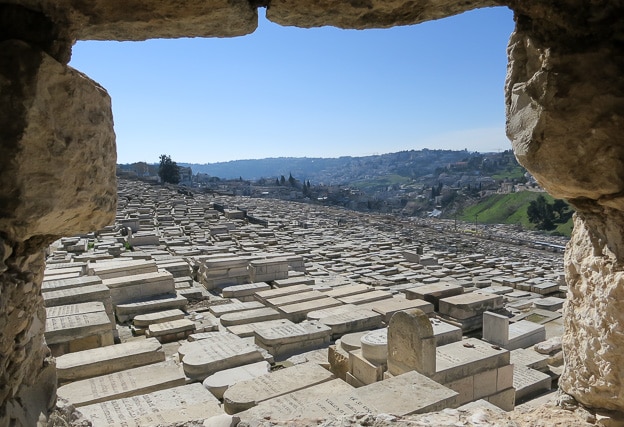
Outside the Old City
Mount of Olives and Gethsemane
Mount of Olives provides a good view of the Old City with an interesting foreground: hills and valley covered with the enormous old cemeteries that surround Jerusalem. Beyond the stone grave-lined valley is the Temple Mount. We recommend walking back to the city, with a stop at the Garden of Gethsemane. Yep, there are some old olive trees (but not that old). Of more interest is the adjacent Church of all Nations, or Basilica of the Agony, built just a century ago through donations by numerous parishes around the world. Their countries are depicted on the ceiling. Exposed bedrock in front of the altar is where Jesus is said to have prayed just before his arrest.
Mahana Yehuda Market
One of the most picturesque markets anywhere. This is the place to see the famous and enormous products of Israel's agricultural heritage. The central food market is busiest on Thursday eves and Friday mornings. The surrounding market stalls extend for blocks up and down the street.
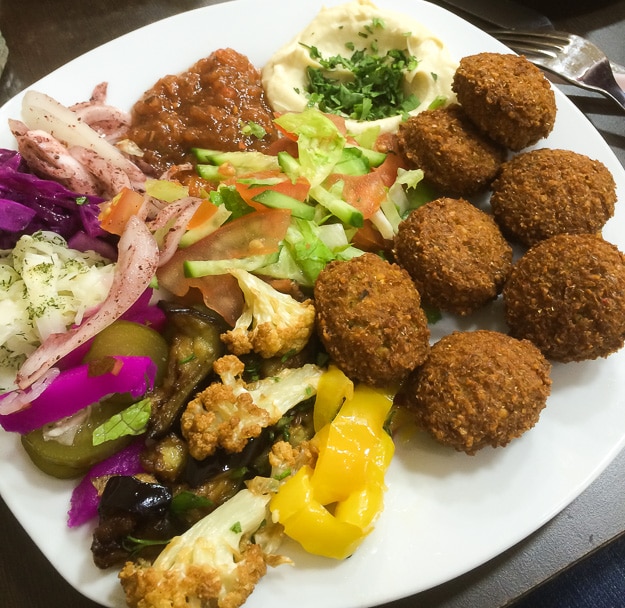
Restaurants
Arches in the Old City
Heading down the main walkway, pick a place like this for falafels made to order.
Kadosh
Start here for a relaxed introduction to Jerusalem's pastries, coffee, and lunch salads and sandwiches.
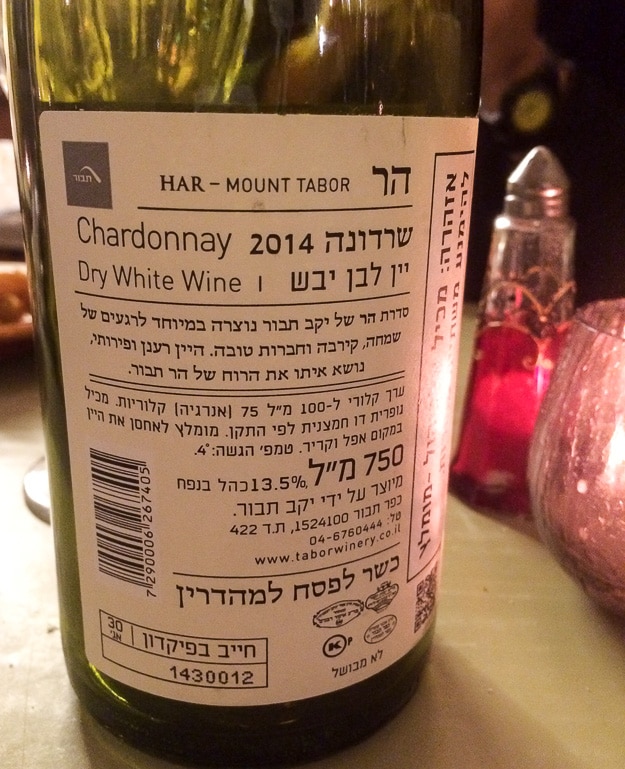
HaMotzi
Like many places in Jerusalem, we found the service disinterested, but the food was wonderful. We know this place has a good reputation, because we had to ask strangers on the street for directions, twice. Our choice was met with approval and we're glad we found the place.
Tmol Shilshom
A wonderful cafe/restaurant/bookshop. Good food in a cozy place. What could be better than browsing the books and periodicals on the shelves while sipping a hot cider? Breakfast, including the popular Israeli Shakshuka poached egg dish, is available all day.
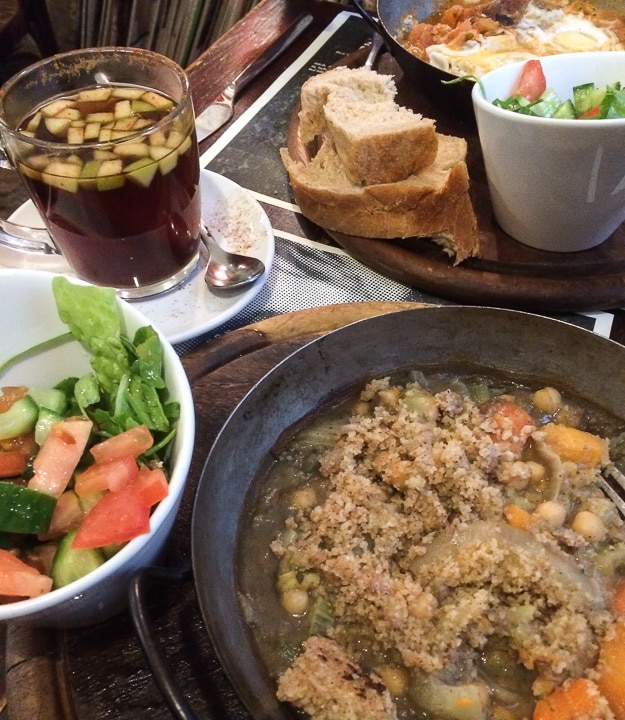
Cafe Rimon
This is one of the few kosher restaurants that still maintains two separate kitchens (rather than choosing to be either a meat or a dairy establishment). We sat on the dairy side. While others sing praises of this place, it was nothing exciting on this occasion. My veggie dinner was fine; Tom's fish was cooked to extinction.
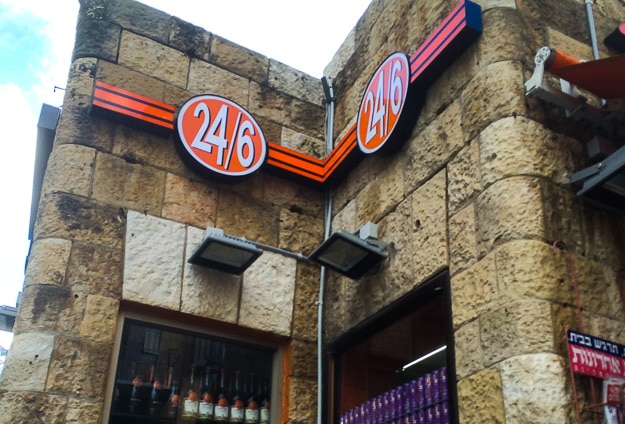
A Place to Stay
*City Center Apartment Hotel
Considering, especially, the amount of time I spent sleeping and recuperating in this room, we were really pleased with our accommodations in Jerusalem. Located on one side of the Downtown Triangle, this place is an easy walk to plenty of restaurants, juice stands, and coffee shops. Our room, though small and beige, included a microwave and refrigerator and spacious shower.
Up Your Travel Skills
Looking to book your next trip? Use these resources that are tried and tested by us. First, to get our best travel tips, sign up for our email newsletter. Then, be sure to start your reading with our Resources Page where we highlight all the great travel companies and products that we trust. Travel Accessories: Check out our list of all the accessories we carry to make getting there and being there a lot easier. Credit Cards: See our detailed post on how to choose the right travel rewards credit card for you. Flights: Start finding the very best flight deals by subscribing to Thrifty Traveler. Book your Hotel: Find the best prices on hotels with Booking.com. See all of the gear and books we like in one place on our Amazon shop.Got a comment on this post? Join the conversation on Facebook, Instagram, or Threads and share your thoughts!

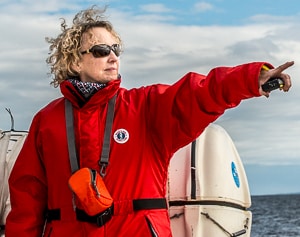
Comments are closed.